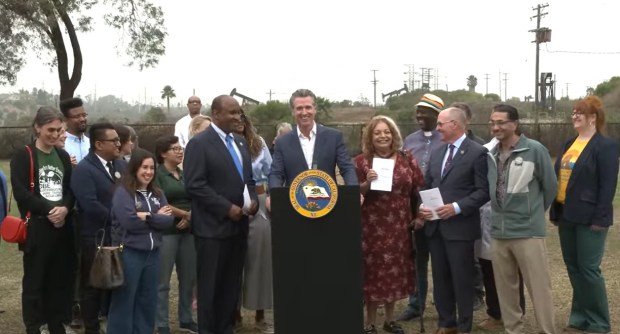In the latest setback for the oil industry in California, Gov. Gavin Newsom on Wednesday signed a new law that allows cities, counties, and local voters to block construction of new oil and gas wells in their communities.
The bill, AB 3233, by Assemblywoman Dawn Addis, D-Monterey, which the industry staunchly opposed, overturns a state Supreme Court ruling from last fall. In that case, the justices ruled in favor of Chevron and nullified a ballot measure that Monterey County voters passed in 2016 to ban new oil and gas wells there over pollution concerns, saying that state regulations took precedent.
Environmental groups pushed hard for the new law, which could affect a broad range of communities that have passed local oil drilling restrictions over the past decade, from Antioch and Brentwood in Contra Costa County to Santa Cruz County to the city of Los Angeles.
Newsom, who called a special session of the Legislature this month to address gas prices, was sharply critical Wednesday of oil companies, an industry that he has increasingly clashed with in recent years over pollution and climate change.
“They are the polluted heart of this climate crisis,” Newsom said. “They have been lying and deceiving us for decades and decades. It is finally time to hold big oil accountable.”

Earlier this month, a Los Angeles County judge, citing the state Supreme Court ruling, struck down an ordinance passed unanimously in 2022 by the Los Angeles City Council that barred new oil and gas extraction and required that all existing operations in the city limits to stop production within 20 years.
Newsom also signed two other bills Wednesday tightening rules on the oil industry.
They are AB 1866, by Assemblyman Gregg Hart (D-Santa Barbara), which increases oil industry requirements to plug and clean up idle oil and gas wells. There are nearly 40,000 idle oil and gas wells in California. Of those, an estimated 5,300 are “orphan wells” where the original drillers have gone out of business or filed bankruptcy and taxpayers are left to pay cleanup costs of millions of dollars.
“We will hold the oil industry accountable for their pollution and their public health impacts,” Hart said Wednesday.
The other bill Newsom signed was AB 2716, by Assemblyman Isaac Bryan (D-Los Angeles), which prohibits the operation of low-production oil and gas wells in the Inglewood Oil Field oil field within the Baldwin Hills Conservancy in Los Angeles County. The area, which has an estimated 441 such oil wells, sits next to a state park, soccer fields, and other public facilities used by children.
Opponents, led by the Western States Petroleum Association, an influential industry trade group whose members include Chevron, ExxonMobil, Shell and Valero, say the bills went too far.
In a statement last month, the association said the bills would “impose impractical limits on oil and gas operations, creating a fragmented system.” It also noted that California imports roughly 75% of the oil it consumes.
“This reliance on imported oil not only drives up fuel prices for consumers but also compromises our environmental goals by bypassing California’s strict standards,” the association said.
Asked Wednesday by reporters if the new laws would increase California’s gasoline prices, Newsom said no. He argued that the oil industry has been gouging motorists for years, citing the fact that prices have been increasing recently even as world crude oil prices are falling.
A key part of his special session would require refineries to keep larger supplies of gasoline on hand, to reduce price spikes when there are refinery outages or maintenance issues. The industry and the governors of neighboring Arizona and Nevada have said the rule could further increase prices.
Environmental groups praised the new bills Wednesday.
“The oil industry used threats and intimidation to try to kill vital local protections from industry pollution, said Hollin Kretzmann, an attorney with the Center for Biological Diversity in Oakland. “We finally have the assurances under state law that local governments can, and always could, restrict oil and gas to protect communities and the climate.”
Many of the state’s oil fields are located near low-income communities. Pollution from them has significant impacts on nearby residents, particularly children, who have high levels of asthma and other ailments.
“We see our kids, they are missing school. Parents are not going to work because someone needs to take care of them,” said Dr. Ilan Shapiro, a pediatrician with AltaMed Health Services, a medical network in Los Angeles.
“Our communities are living in places where the environment is leaving a scar for the rest of their lives,” he added. “We have in our hands the opportunity to make a difference.”
In recent years, Newsom has been steadily cracking down on Big Oil as part of the state’s efforts to reduce air pollution and greenhouse gas emissions.
Four years ago, he signed a landmark executive order requiring all new passenger vehicles sold in California by 2035 to be zero-emission.
Two years ago, he signed another law requiring all of California’s electricity by 2045 to come from carbon-free sources such as solar, wind, geothermal, hydroelectric or nuclear. Today the state is at 61%.
Newsom also signed a law in 2022 that blocked new oil and gas wells statewide within 3,200 feet of homes, schools and parks. The oil industry had planned to put a measure on the November ballot to overturn it but pulled it this summer, reportedly amid polling that showed it would fail.
Originally Published:
Source: www.mercurynews.com
